formerly eScholarship Editions


|
|
|
|
Your search for
'Social Problems' in subject
found 54 book(s). | Modify Search | Displaying 41 - 54 of 54 book(s) | |
| 41. | 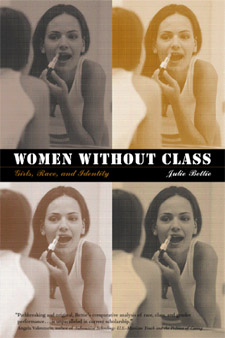 | Title: Women without class: girls, race, and identity Author: Bettie, Julie 1965- Published: University of California Press, 2003 Subjects: Gender Studies | Women's Studies | Sociology | Chicano Studies | American Studies | Popular Culture | Education | Anthropology | Social Problems | Immigration Publisher's Description: In this examination of white and Mexican-American girls coming of age in California's Central Valley, Julie Bettie turns class theory on its head and offers new tools for understanding the ways in which class identity is constructed and, at times, fails to be constructed in relationship to color, ethnicity, gender, and sexuality. Documenting the categories of subculture and style that high school students use to explain class and racial/ethnic differences among themselves, Bettie depicts the complex identity performances of contemporary girls. The title, Women Without Class, refers at once to young working-class women who have little cultural capital to enable class mobility, to the fact that class analysis and social theory has remained insufficiently transformed by feminist and ethnic studies, and to the fact that some feminist analysis has itself been complicit in the failure to theorize women as class subjects. Bettie's research and analysis make a case for analytical and political attention to class, but not at the expense of attention to other axes of identity and social formations. [brief] Similar Items |
| 42. | 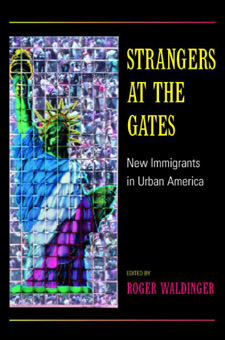 | Title: Strangers at the gates: new immigrants in urban America Author: Waldinger, Roger David Published: University of California Press, 2001 Subjects: Sociology | American Studies | Anthropology | Urban Studies | African American Studies | Asian American Studies | Latino Studies | Labor Studies | Social Problems | Immigration Publisher's Description: Immigration is remaking the United States. In New York, Los Angeles, Miami, San Francisco, and Chicago, the multiethnic society of tomorrow is already in place. Yet today's urban centers appear unlikely to provide newcomers with the same opportunities their predecessors found at the turn of the last century. Using the latest sources of information, this hard-hitting volume of original essays looks at the nexus between urban realities and immigrant destinies in these American cities. Strangers at the Gates tells the real story of immigrants' prospects for success today and delineates the conditions that will hinder or aid the newest Americans in their quest to get ahead. This book stresses the crucial importance of understanding that immigration today is fundamentally urban and the equally important fact that immigrants are now flocking to places where low-skilled workers--regardless of ethnic background--are in particular trouble. These two themes are at the heart of this book, which also covers a range of provocative topics, often with surprising findings. Among the essayists, Nelson Lim enters the controversy over whether and how immigrants affect the employment prospects for African Americans; Mark Ellis investigates whether low immigrant wages depress other workers' salaries; William A.V. Clark contends that immigrants seem to be experiencing downward mobility; and Min Zhou asserts that trends among second-generation immigrants are decidedly more optimistic. These well-integrated and well-organized essays sit squarely at the intersection of sociology and economics, and along the way they point out both the strengths and the weaknesses of these two disciplines in understanding immigration. Providing a theoretically and empirically comprehensive overview of the economic fate of immigrants in major American cities, this book will make a major contribution to debates over immigration and the American future. [brief] Similar Items |
| 43. | 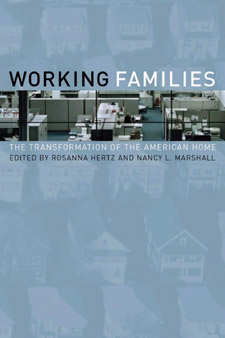 | Title: Working families: the transformation of the American home Author: Hertz, Rosanna Published: University of California Press, 2001 Subjects: Gender Studies | Women's Studies | Sociology | Social Problems | Anthropology | Economics and Business | Urban Studies | Ethnic Studies | Politics | Politics Publisher's Description: The dynamics of work and parenthood are in the midst of a revolutionary shift in the United States. Focused around a major factor in this shift - the rise of dual-income families - this groundbreaking volume provides a highly informative snapshot of the intricate fabric of work and family in the United States. With selections written by leading scholars both inside and outside academia, Working Families offers intimate stories of how families manage and how children respond to the rigors of their parents' lives, as well as broad overviews developed from survey and census data. Taken together, these essays present an updated and integral view of the revolutionary changes in patterns of work and family life occurring today. Using a broad range of methodologies, the contributors reach across gender, age, and class differences. They discuss working-class as well as affluent dual-career couples and work sites ranging from factories to offices. Straddling racial divides, the essays range from studies of white day care providers to a close look at a Mexican maid's daughter. The collection as a whole refutes the assumption that there is one normal type of family or workplace. These readable essays capture our attention as they build, cumulatively, to an absorbing picture of today's families and workplaces. [brief] Similar Items |
| 44. | 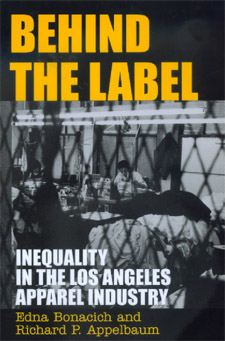 | Title: Behind the label: inequality in the Los Angeles apparel industry Author: Bonacich, Edna Published: University of California Press, 2000 Subjects: Sociology | Social Problems | California and the West | Labor Studies | Economics and Business | Urban Studies | American Studies | Ethnic Studies Publisher's Description: In a study crucial to our understanding of American social inequality, Edna Bonacich and Richard Appelbaum investigate the return of sweatshops to the apparel industry, especially in Los Angeles. The "new" sweatshops, they say, need to be understood in terms of the decline in the American welfare state and its strong unions and the rise in global and flexible production. Apparel manufacturers now have the incentive to move production to wherever low-wage labor can be found, while maintaining arm's-length contractual relations that protect them from responsibility. The flight of the industry has led to a huge rise in apparel imports to the United States and to a decline in employment. Los Angeles, however, remains a puzzling exception in that its industry employment has continued to grow, to the point where L.A. is the largest center of apparel production in the nation. Not only the availability of low-wage immigrant (often undocumented) workers but also the focus on moderately priced, fashion-sensitive women's wear makes this possible. Behind the Label examines the players in the L.A. apparel industry, including manufacturers, retailers, contractors, and workers, evaluating the maldistribution of wealth and power. The authors explore government and union efforts to eradicate sweatshops while limiting the flight to Mexico and elsewhere, and they conclude with a description of the growing antisweatshop movement. Los Angeles Times Best Nonfiction Book of 2000 [brief] Similar Items |
| 45. | 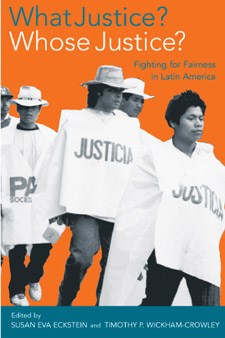 | Title: What justice? whose justice?: fighting for fairness in Latin America Author: Eckstein, Susan 1942- Published: University of California Press, 2003 Subjects: Sociology | Economics and Business | Conservation | Latin American Studies | Politics | Postcolonial Studies | Anthropology | Social Problems Publisher's Description: The new millennium began with the triumph of democracy and markets. But for whom is life just, how so, and why? And what is being done to correct persisting injustices? Blending macro-level global and national analysis with in-depth grassroots detail, the contributors highlight roots of injustices, how they are perceived, and efforts to alleviate them. Following up on issues raised in the groundbreaking best-seller Power and Popular Protest: Latin American Social Movements (California, 2001), these essays elucidate how conceptions of justice are socially constructed and contested and historically contingent, shaped by people's values and institutionally grounded in real-life experiences. The contributors, a stellar coterie of North and Latin American scholars, offer refreshing new insights that deepen our understanding of social justice as ideology and practice. [brief] Similar Items |
| 46. | 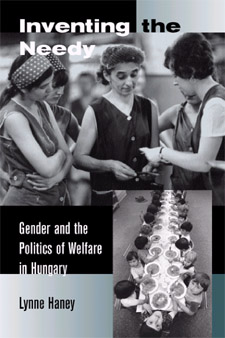 | Title: Inventing the needy: gender and the politics of welfare in Hungary Author: Haney, Lynne A. (Lynne Allison) 1967- Published: University of California Press, 2002 Subjects: Sociology | European Studies | European History | Gender Studies | Law | Social Problems | Political Theory | Russian and Eastern European Studies | Sociology | Sociology Publisher's Description: Inventing the Needy offers a powerful, innovative analysis of welfare policies and practices in Hungary from 1948 to the last decade of the twentieth century. Using a compelling mix of archival, interview, and ethnographic data, Lynne Haney shows that three distinct welfare regimes succeeded one another during that period and that they were based on divergent conceptions of need. The welfare society of 1948-1968 targeted social institutions, the maternalist welfare state of 1968-1985 targeted social groups, and the liberal welfare state of 1985-1996 targeted impoverished individuals. Because they reflected contrasting conceptions of gender and of state-recognized identities, these three regimes resulted in dramatically different lived experiences of welfare. Haney's approach bridges the gaps in scholarship that frequently separate past and present, ideology and reality, and state policies and local practices. A wealth of case histories gleaned from the archives of welfare institutions brings to life the interactions between caseworkers and clients and the ways they changed over time. In one of her most provocative findings, Haney argues that female clients' ability to use the state to protect themselves in everyday life diminished over the fifty-year period. As the welfare system moved away from linking entitlement to clients' social contributions and toward their material deprivation, the welfare system, and those associated with it, became increasingly stigmatized and pathologized. With its focus on shifting inventions of the needy, this broad historical ethnography brings new insights to the study of welfare state theory and politics. [brief] Similar Items |
| 47. | 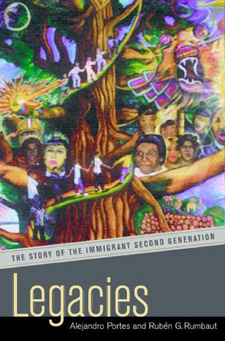 | Title: Legacies: the story of the immigrant second generation Author: Portes, Alejandro 1944- Published: University of California Press, 2001 Subjects: Sociology | Ethnic Studies | Anthropology | Asian American Studies | Chicano Studies | Postcolonial Studies | Politics | Latino Studies | Social Problems | Immigration Publisher's Description: One out of five Americans, more than 55 million people, are first-or second-generation immigrants. This landmark study, the most comprehensive to date, probes all aspects of the new immigrant second generation's lives, exploring their immense potential to transform American society for better or worse. Whether this new generation reinvigorates the nation or deepens its social problems depends on the social and economic trajectories of this still young population. In Legacies, Alejandro Portes and Rubén G. Rumbaut - two of the leading figures in the field - provide a close look at this rising second generation, including their patterns of acculturation, family and school life, language, identity, experiences of discrimination, self-esteem, ambition, and achievement. Based on the largest research study of its kind, Legacies combines vivid vignettes with a wealth of survey and school data. Accessible, engaging, and indispensable for any consideration of the changing face of American society, this book presents a wide range of real-life stories of immigrant families - from Mexico, Cuba, Nicaragua, Colombia, the Dominican Republic, Haiti, Jamaica, Trinidad, the Philippines, China, Laos, Cambodia, and Vietnam - now living in Miami and San Diego, two of the areas most heavily affected by the new immigration. The authors explore the world of second-generation youth, looking at patterns of parent-child conflict and cohesion within immigrant families, the role of peer groups and school subcultures, the factors that affect the children's academic achievement, and much more. A companion volume to Legacies, entitled Ethnicities: Children of Immigrants in America, was published by California in Fall 2001. Edited by the authors of Legacies, this book will bring together some of the country's leading scholars of immigration and ethnicity to provide a close look at this rising second generation. A Copublication with the Russell Sage Foundation [brief] Similar Items |
| 48. | 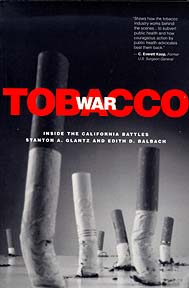 | Title: Tobacco war: inside the California battles Author: Glantz, Stanton A Published: University of California Press, 2000 Subjects: American Studies | California and the West | Public Policy | Politics | Social Problems | Economics and Business | Medicine | Environmental Studies | Sociology Publisher's Description: Tobacco War charts the dramatic and complex history of tobacco politics in California over the past quarter century. Beginning with the activities of a small band of activists who, in the 1970s, put forward the radical notion that people should not have to breathe second-hand tobacco smoke, Stanton Glantz and Edith Balbach follow the movement through the 1980s, when activists created hundreds of city and county ordinances by working through their local officials, to the present--when tobacco is a highly visible issue in American politics and smoke-free restaurants and bars are a reality throughout the state. The authors show how these accomplishments rest on the groundwork laid over the past two decades by tobacco control activists who have worked across the U.S. to change how people view the tobacco industry and its behavior. Tobacco War is accessibly written, balanced, and meticulously researched. The California experience provides a graphic demonstration of the successes and failures of both the tobacco industry and public health forces. It shows how public health advocates slowly learned to control the terms of the debate and how they discovered that simply establishing tobacco control programs was not enough, that constant vigilance was necessary to protect programs from a hostile legislature and governor. In the end, the California experience proves that it is possible to dramatically change how people think about tobacco and the tobacco industry and to rapidly reduce tobacco consumption. But California's experience also demonstrates that it is possible to run such programs successfully only as long as the public health community exerts power effectively. With legal settlements bringing big dollars to tobacco control programs in every state, this book is must reading for anyone interested in battling and beating the tobacco industry. [brief] Similar Items |
| 49. | 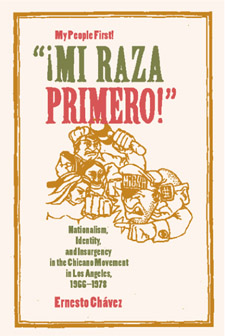 | Title: "Mi raza primero!" (My people first!): nationalism, identity, and insurgency in the Chicano movement in Los Angeles, 1966-1978 Author: Chávez, Ernesto 1962- Published: University of California Press, 2002 Subjects: History | California and the West | Californian and Western History | Chicano Studies | Sociology | Politics | Social Problems | Immigration Publisher's Description: ¡Mi Raza Primero! is the first book to examine the Chicano movement's development in one locale - in this case Los Angeles, home of the largest population of people of Mexican descent outside of Mexico City. Ernesto Chávez focuses on four organizations that constituted the heart of the movement: The Brown Berets, the Chicano Moratorium Committee, La Raza Unida Party, and the Centro de Acción Social Autónomo, commonly known as CASA. Chávez examines and chronicles the ideas and tactics of the insurgency's leaders and their followers who, while differing in their goals and tactics, nonetheless came together as Chicanos and reformers. Deftly combining personal recollection and interviews of movement participants with an array of archival, newspaper, and secondary sources, Chávez provides an absorbing account of the events that constituted the Los Angeles-based Chicano movement. At the same time he offers insights into the emergence and the fate of the movement elsewhere. He presents a critical analysis of the concept of Chicano nationalism, an idea shared by all leaders of the insurgency, and places it within a larger global and comparative framework. Examining such variables as gender, class, age, and power relationships, this book offers a sophisticated consideration of how ethnic nationalism and identity functioned in the United States during the 1960s and 1970s. [brief] Similar Items |
| 50. | 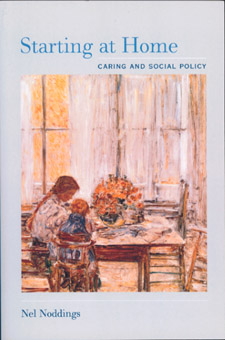 | Title: Starting at home: caring and social policy Author: Noddings, Nel Published: University of California Press, 2002 Subjects: Politics | American Studies | Anthropology | Social and Political Thought | Political Theory | Public Policy | Social Problems | Public Policy | Sociology | Sociology Publisher's Description: Nel Noddings, one of the central figures in the contemporary discussion of ethics and moral education, argues that caring--a way of life learned at home--can be extended into a theory that guides social policy. Tackling issues such as capital punishment, drug treatment, homelessness, mental illness, and abortion, Noddings inverts traditional philosophical priorities to show how an ethic of care can have profound and compelling implications for social and political thought. Instead of beginning with an ideal state and then describing a role for home and family, this book starts with an ideal home and asks how what is learned there may be extended to the larger social domain. Noddings examines the tension between freedom and equality that characterized liberal thought in the twentieth century and finds that--for all its strengths--liberalism is still inadequate as social policy. She suggests instead that an attitude of attentive love in the home induces a corresponding responsiveness that can serve as a foundation for social policy. With her characteristic sensitivity to the individual and to the vulnerable in society, the author concludes that any corrective practice that does more harm than the behavior it is aimed at correcting should be abandoned. This suggests an end to the disastrous war on drugs. In addition, Noddings states that the caring professions that deal with the homeless should be guided by flexible policies that allow practitioners to respond adequately to the needs of very different clients. She recommends that the school curriculum should include serious preparation for home life as well as for professional and civic life. Emphasizing the importance of improving life in everyday homes and the possible role social policy might play in this improvement, Starting at Home highlights the inextricable link between the development of care in individual lives and any discussion of moral life and social policy. [brief] Similar Items |
| 51. | 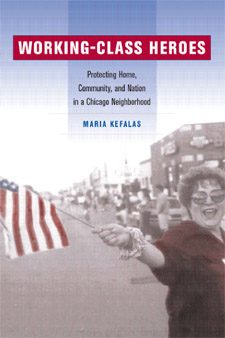 | Title: Working-class heroes: protecting home, community, and nation in a Chicago neighborhood Author: Kefalas, Maria Published: University of California Press, 2003 Subjects: Sociology | American Studies | Anthropology | Urban Studies | Ethnic Studies | Gender Studies | Politics | Social Problems | Urban Studies | Urban Studies Publisher's Description: Chicago's Southwest Side is one of the last remaining footholds for the city's white working class, a little-studied and little-understood segment of the American population. This book paints a nuanced and complex portrait of the firefighters, police officers, stay-at-home mothers, and office workers living in the stable working-class community known as Beltway. Building on the classic Chicago School of urban studies and incorporating new perspectives from cultural geography and sociology, Maria Kefalas considers the significance of home, community, and nation for Beltway residents. [brief] Similar Items |
| 52. | 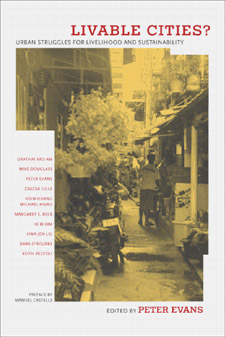 | Title: Livable cities?: urban struggles for livelihood and sustainability Author: Evans, Peter B 1944- Published: University of California Press, 2002 Subjects: American Studies | Environmental Studies | Social Problems | Public Policy | Political Theory | Pacific Rim Studies | Urban Studies | Latin American Studies | Urban Studies | Urban Studies Publisher's Description: The sprawling cities of the developing world are vibrant hubs of economic growth, but they are also increasingly ecologically unsustainable and, for ordinary citizens, increasingly unlivable. Pollution is rising, affordable housing is decreasing, and green space is shrinking. Since three-quarters of those joining the world's population during the next century will live in Third World cities, making these urban areas more livable is one of the key challenges of the twenty-first century. This book explores the linked issues of livelihood and ecological sustainability in major cities of the developing and transitional world. Livable Cities? identifies important strategies for collective solutions by showing how political alliances among local communities, nongovernmental organizations, and public agencies can help ordinary citizens live better lives. [brief] Similar Items |
| 53. | 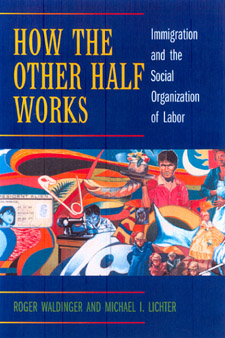 | Title: How the other half works: immigration and the social organization of labor Author: Waldinger, Roger David Published: University of California Press, 2003 Subjects: Sociology | Urban Studies | Ethnic Studies | Labor Studies | Immigration | Chicano Studies | Social Problems | Urban Studies | California and the West | California and the West Publisher's Description: How the Other Half Works solves the riddle of America's contemporary immigration puzzle: why an increasingly high-tech society has use for so many immigrants who lack the basic skills that today's economy seems to demand. In clear and engaging style, Waldinger and Lichter isolate the key factors that explain the presence of unskilled immigrants in our midst. Focusing on Los Angeles, the capital of today's immigrant America, this hard-hitting book elucidates the other side of the new economy, showing that hiring is finding not so much "one's own kind" but rather the "right kind" to fit the demeaning, but indispensable, jobs many American workers disdain. [brief] Similar Items |
| 54. | 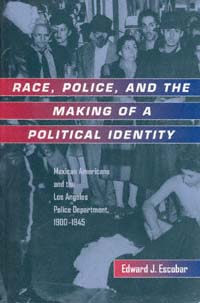 | Title: Race, police, and the making of a political identity: Mexican Americans and the Los Angeles Police Department, 1900-1945 Author: Escobar, Edward J 1946- Published: University of California Press, 1999 Subjects: History | California and the West | Latin American History | Latino Studies | Social Problems | Politics | Californian and Western History | Urban Studies | Criminology | Criminology Publisher's Description: In June 1943, the city of Los Angeles was wrenched apart by the worst rioting it had seen to that point in the twentieth century. Incited by sensational newspaper stories and the growing public hysteria over allegations of widespread Mexican American juvenile crime, scores of American servicemen, joined by civilians and even police officers, roamed the streets of the city in search of young Mexican American men and boys wearing a distinctive style of dress called a Zoot Suit. Once found, the Zoot Suiters were stripped of their clothes, beaten, and left in the street. Over 600 Mexican American youths were arrested. The riots threw a harsh light upon the deteriorating relationship between the Los Angeles Mexican American community and the Los Angeles Police Department in the 1940s.In this study, Edward J. Escobar examines the history of the relationship between the Los Angeles Police Department and the Mexican American community from the turn of the century to the era of the Zoot Suit Riots. Escobar shows the changes in the way police viewed Mexican Americans, increasingly characterizing them as a criminal element, and the corresponding assumption on the part of Mexican Americans that the police were a threat to their community. The broader implications of this relationship are, as Escobar demonstrates, the significance of the role of the police in suppressing labor unrest, the growing connection between ideas about race and criminality, changing public perceptions about Mexican Americans, and the rise of Mexican American political activism. [brief] Similar Items |